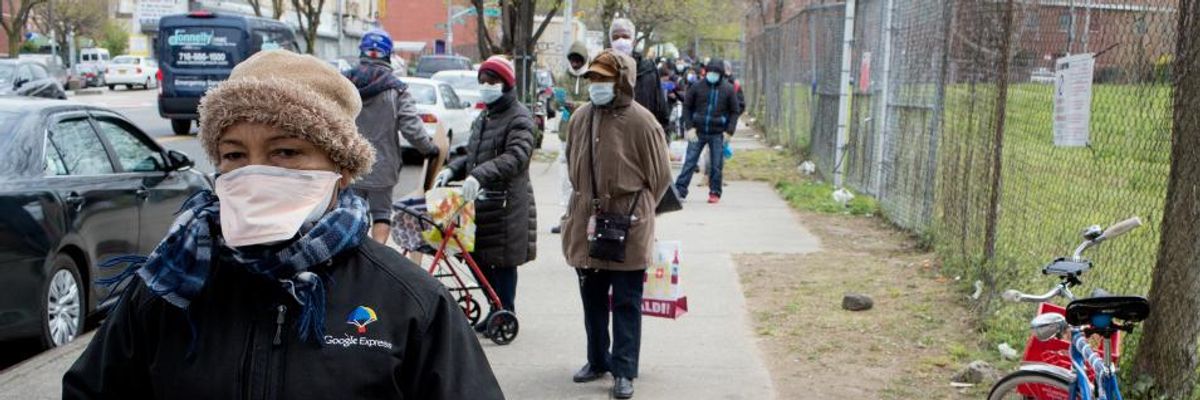An unprecedented avalanche of jobless claims over the past month due to the coronavirus pandemic has overwhelmed state governments' antiquated unemployment systems and produced an enormous backlog of unpaid benefits, leaving millions of people on the brink of financial ruin with another rent payment due in just a week.
According to a Washington Postanalysis published Thursday, "the economic carnage wrought by the coronavirus has resulted in a national backlog of at least 3 million unpaid jobless claims."
"The figure reflects claims made by April 4," the Post reported. "The true backlog is probably far greater, following the release of new federal data Thursday showing an additional 4 million people who filed for unemployment last week." More than 26 million people in the U.S. have filed jobless claims over the past month, according to the latest Labor Department data.
"Perfect storm of unemployment benefit cuts and access restrictions so destabilized the foundation of the unemployment insurance program that we are now witnessing its dysfunction in real time."
--Michele Evermore, National Employment Law Project
The backlog of benefits is most severe in Florida, where Republican political leaders have imposed punitive restrictions on unemployment insurance and refused to modernize the state's crumbling technological infrastructure. More than 1.7 million Floridians have filed for unemployment since mid-March, but state data released Thursday showed that just over 108,000 people have received benefits.
"Those who have been paid represent just 6 percent of the total number of filings," the Tampa Bay Times reported.
As of this writing, the Florida unemployment website is down for maintenance and will not be back online until Monday, April 27. New applicants can still file for benefits, but those who have already submitted applications cannot currently check the site for status updates.
An anonymous adviser to Florida Gov. Ron DeSantis, a Republican, blamed previous GOP Gov. Rick Scott for the state's broken unemployment system.
"It's a shit sandwich, and it was designed that way by Scott," the DeSantis adviser said of the unemployment system in an interview with Politico earlier this month. "It wasn't about saving money. It was about making it harder for people to get benefits or keep benefits so that the unemployment numbers were low to give the governor something to brag about."
Anecdotal accounts from people in Florida and across the nation who are desperately attempting to obtain their benefits paint a portrait of a fragmented and deficient U.S. unemployment system, which is overseen by the federal government but administered by individual states with significant leeway to expand or restrict eligibility.
The CARES Act, which President Donald Trump signed into law last month, authorized a temporary $600-per-week increase in unemployment on top of the sum that states already provide, which varies widely state by state.
"I've gone on every day since and checked my application status," one laid-off Florida worker who applied for benefits in late March toldThe Guardian last week. "Just to go on and get logged in takes sometimes 45 minutes to an hour. You have to keep hitting refresh."
Jeffrey Swartz of Clarkdale, Arizona toldThe Arizona Republic Wednesday that his efforts to navigate the state's unemployment system have been "a nightmare so far."
"Today alone, I was finally able to sit on hold almost four hours," said Swartz. "Then I got disconnected."
The CARES Act is supposed to expand benefits to freelancers and gig workers, but many have reported experiencing significant delays in receiving payments.
"We still don't know how we're going to survive this," Mekela Edwards, a Lyft and Uber driver in California, told Politico last week. "Me personally, I don't know how I'm going to survive this."
Michele Evermore, a senior policy analyst and researcher with the National Employment Law Project, said in a statement Tuesday that a "perfect storm of unemployment benefit cuts and access restrictions so destabilized the foundation of the unemployment insurance program that we are now witnessing its dysfunction in real time."
"We've reached the point where it's too late to prepare states in advance for the massive tsunami of unemployment that is rocking the economy and state unemployment systems," said Evermore.
Sen. Ron Wyden (D-Calif.) and more than a dozen other Democratic senators sent a letter to congressional leaders earlier this week demanding that the next Covid-19 stimulus package include additional funding to ensure that states have the resources to accommodate the surge in unemployment claims.
The senators also said federal digital resources should be made readily available to help state and local governments modernize their unemployment systems.
"News reports abound showing hours-long hold times for Americans seeking assistance with unemployment claims, small business loans and grants, and other emergency programs," the letter states. "These federal programs, which are administered by the states, are of the utmost importance to American workers and businesses. They must be able to serve this skyrocketing need, per congressional intent in the CARES Act."

